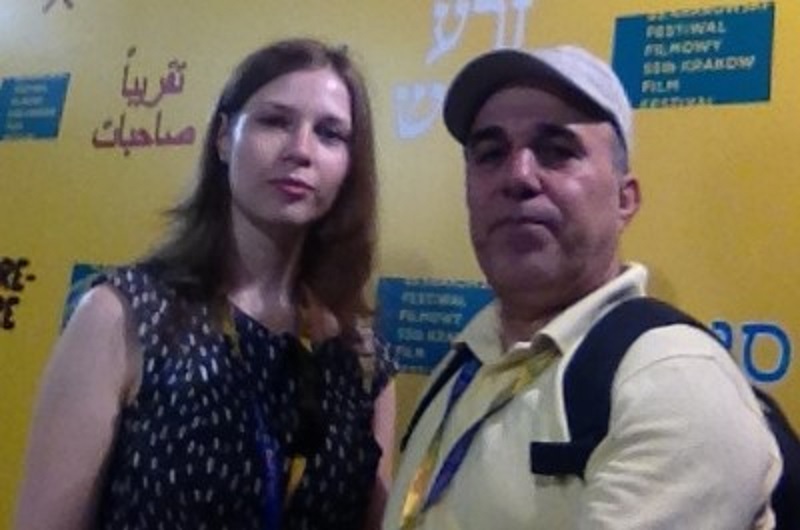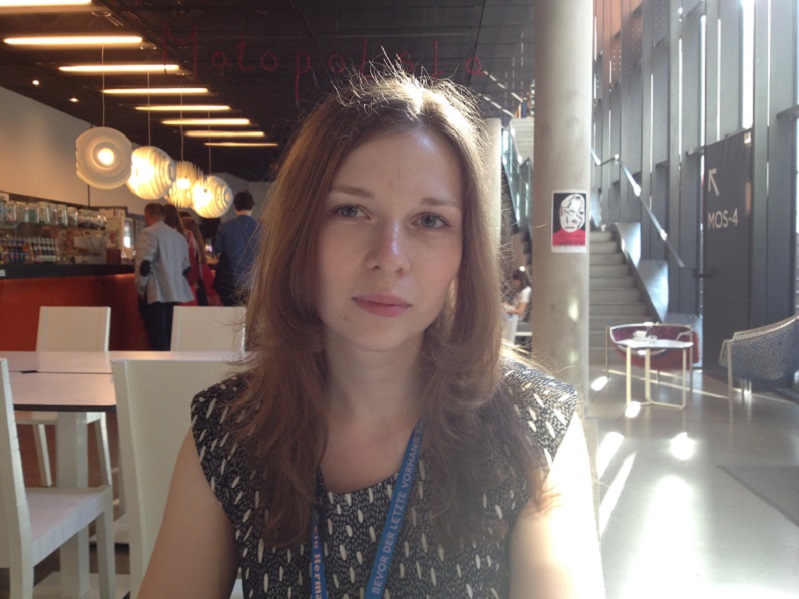Interview : Russian director Anastasia Novikova
“International Film Festival in Krakow” :
We met the young Russian director Anastasia Novikova in the city of Krakow in Poland. She was participating in the 55th International Film Festival. Our conversation was as follows:
Interviewer: Nidal Hamad in Krakow 6-6-2015
Nidal: Anastasia, please, talk about yourself.
Anastasia: I live in St.Petersburg, and I graduated from Saint-Petersburg State University of Cinema and Television. “The converasation” is the film that I started developing while being a student, as the graduation project, and after I graduated my professor Alexander Gutman believed in me and produced my documentary. Now we have an almost 22 min. version of the film.
Nidal: Is this your first film?
Anastasia: Yes, it’s my debut film.
Nidal: And what is the message of the film?
Anastasia: I’m not sure if it has a clear message. I deliberately want it to be open to interpretation. I want the film to be yours, just as I’d like you to have your own ideas of what it’s about. That’s why, although it has a very clear structure, the ending is a big question mark. It’s for you to decide what happens next. I don’t want to insist that the film is about loneliness or suffering, therefore you’re obligated to feel sad. I don’t want to manipulate the audience into feeling a certain way, quite the opposite.
I don’t know if this qualifies as a message exactly, but it’s important for me that the story of my protagonist matters. I wanted to become an intermediary between him and the spectator. Spectator, singular, because the film is speaking to every person separately. No pompousness, no loud words. Just a man and his longing. It’s a very personal story for me as well as for Valentin. Just as now it’s between you and him. It’s a “Conversation” between you two. This is what inspired me along the way, the idea of putting something seemingly irrelevant, small and forgotten, like the abandoned village that surrounds Valentin Stepanovich, and giving it timeless power.
Nidal: How did you meet Valentin?
For several months I’d been interested in abandoned places and specifically places on the verge of life and death. I learned about the place online but there wasn’t much information because it’s quite remote and forgotten. There are no roads, and there isn’t a proper way to get there. But there are some people who were interested in that kind of places specifically, like photographers who are obsessed with abandoned buildings. One day I got lucky and I encountered people who were going to the settlement themselves. They invited me to go with them, which was risky because it wasn’t like me at all. I’m kind of introverted and not very adventurous. It was scary to go to a remote abandoned place with a group of people I hadn’t even met. But I felt I had to do that for some reason, so I decided to go. They left me there in the settlement…
Nidal: Settlement in America?
Anastasia: “America” is the unofficial name of several settlements. This was the farthest one. It was founded in the 30s of the 20th century and I believe it got destroyed around the time the Soviet Union collapsed.
Anyway, they left me there with a radio set and went along to do their business. At first glance the place looked like nothing special. It was late August and it was all green and all woods, no visually appealing abandoned buildings or anything I’d expected. Later during filming, when the leaves came off the whole settlement unravelled and I could finally see the desolation. But during my first visit it was just a forest with a road to nowhere across it, not even a road but remains of a railroad, I could still see the tracks. I thought I’d made a mistake because it looked like there was nothing there. Suddenly I saw a single house hiding in the trees. Valentin came out and greeted me. I asked him if he was the only person living there. And he said: “there is one other guy, my friend, but his wife died so he’s going to leave for the city, so this is the first winter I’ll spend alone here. Come in, let’s have a cup of coffee”. That’s how I met him.
Nidal: And do you know babushka (the old woman)?
I do. Of course!
Nidal: But we don’t see her?
We don’t, but we build the idea of her in our minds through the photographs and through her voice. That’s precisely what I wanted. If he can’t see her, why would the audience?
Obviously, I had to meet her before the filming. She was in the hospital in St. Petersburg during that time, and she was a bit suspicious about me. What was I doing, why was I interested in her? I arranged a meeting and I spoke to her about what I was trying to do. I explained that we were going to record her phone conversations with her husband. Then during filming I stayed with Valentin and I had another sound recordist with her at the hospital. We had a system worked out within our crew. This wasn’t an easy thing to do, especially because the phone reception was truly awful there. They tried to call each other all the time, but there was no connection, just like you see in the film.
Nidal: Your film was viewed at the festival in Madrid. How was it?
Yes, it was great. The festival was a bit smaller and more intimate than this one, which I enjoyed because I’m naturally drawn to intimate atmosphere. We had two screenings there, and then another two after the closing ceremony, because we won the Special Jury’s Prize. The film was very well received. Usually when I show it in Russia there are several parts during the phone conversation where people laugh, especially when he asks “just what part of you looks awful”? He has a very peculiar manner of speaking. I was always afraid that we’d lost something in translation, but people in Madrid laughed too. It was surprising and very enjoyable for me that people got the humour. I don’t want the film to leave you with a heavy heart, so humour is an important part of the experience. Here in Poland people laughed as well, which is what I’d expected because Polish is closer to Russian.
Nidal: What do you think about Krakow film festival?
it’s a big festival, at least the biggest one I’ve been to. Our world premiere was at Hot Docs Toronto, a big Northern American documentary festival, but unfortunately I didn’t get a chance to go. But I was not only lucky to be selected but also to attend Krakow film festival. Unfortunately I haven’t seen many films because I had a lot of events to participate in, like the presentation of my own film, but I’m going to the winner’s screenings now and I’ll finally watch as many films as I can. The festival is very well organized and I the overall level of the films is high. In fact, from what I’ve seen I’m quite humbled by the company I’m in. There are some incredible directors in my competition.
Nidal: Do you know something about Arabic cinema and films?
Not much because I’m not sure where to see the Arabic films. But I am interested. I believe it’s in the human nature to be drawn to a culture that is drastically different from your own background. And this longing is a theme I’d like to explore. If I had the chance to learn more about the Arabic cinema, I would.”
Nidal: Maybe one day we invite you to Jerusalem to Palestine.
You never know.
Nidal: Who helped you with this film?
I had a small crew of four people. Also, I learned a lot from my producer who is a documentary film director himself. My film school background is partly what’s called “The classical Leningrad new wave of cinema”. In a way, I was striving to achieve the feel of those films. The cinematography is very important for me. The director of photography, Pavel Skvortsov, was also a fifth year student at my University. He was very interested in the story and he loved the protagonist just as I did. We all cared about him and his story a great deal, I think that’s what drove us along the way through the tough times. For instance, during the first week of filming, we took interviews and followed Valentin around, but there was nothing interesting happening. It felt pointless. My sound designer and the director of photography started torturing me. “Why did you bring us here? This is not a film!”. That was a bit dramatic for me, but then we started to get to know each other better and most importantly, we started to learn how to work in a team. This film taught me the importance of collaboration. That’s when we started to work out with the right approach and the creative process started shifting. One of the tools we came up with was to leave Valentin alone with the cameras. We used to go another part of the house with the headphones. Therefore, the intimacy of the situation wasn’t ruined and meddled with. He knew he was being filmed, the camera wasn’t hidden, but he was alone, like he was used to. That’s when he began to open up.
Nidal: Did Valentin watch the film?
No, he didn’t. He watched a few shots, but generally he wasn’t interested in watching himself. He said “I like you, guys. I’ve already let you into my life and I trust you. I don’t need to see it. May be Babushka wants to see it… ”
Nidal: How is the radio there? It must be old? And why don’t we see the radio?
Yes, it is very old. It’s barely working. But it wasn’t necessarily relevant to show it. One of the first scenes of the film is a long shot where he sits by the window, listening to the radio. But there isn’t a close-up of the radio itself.
Nidal: I thought that in the film there are four important things: Babushka, Valentin, his phone and his radio.
Right, but as you noticed a lot in the film is based on the sounds. You can hear the radio, you can imagine the radio, see you’ve pictured the radio without actually seeing it, and you imagined that it was very old. That’s the effect I wanted to achieve.
Nidal: I wish you good luck with your next film!
Thank you for the good questions! They really made me want to ramble on and on.
photo al-safsaf.com

photo al-safsaf.com

“Foto: Nacho Lopez para DocumentaMadrid”




